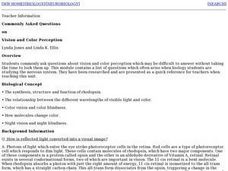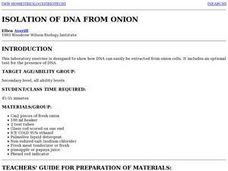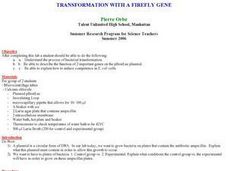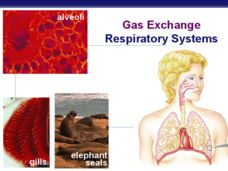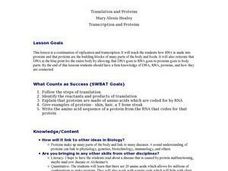Curated OER
Strawberry Smoothies
Biologists extract the DNA from a strawberry. After completing the procedure, learners write answers to a few questions on the lab sheet provided. This is ideal lab practice during a DNA unit in your general biology course.
Curated OER
How Genes Work Lesson Plan
Students define the key terms that are the structure and function of DNA. In this genetics lesson students complete a lab activity in which they construct a model DNA structure.
Curated OER
Cellular Respiration Oxidation of Pyruvate Krebs Cycle
Diagrams with annotations are shown on each of these eighteen slides, which summarize the processes of respiration. The focus is on the 3-step oxidation process and the Krebs cycle. Students should be able to follow these slides during...
Curated OER
DNA Extraction
Students extract and observe a visible amount of DNA from Escherichia. coli cells. They discuss the properties of DNA. Confirmation of the presence of DNA by a reaction with an indicator is confirmed within this lesson. Many hands-on...
Curated OER
Chromosome Karyotyping
High schoolers explore chromosome karyotyping. In this chromosome karyotyping lesson plan, students use a chromosome kit to explore chromosome syndromes and disorders. They also produce a large model of a cell with chromosome to simulate...
Curated OER
Commonly Asked Questions on Vision and Color Perception
Learners commonly ask question about vision and color perception which may be difficult to answer without taking. They use this module that contains a list of questions which often arise when biology students are studying the nervous...
Curated OER
The Circulatory System
In this circulatory system worksheet, students review the functions of red blood cells, white blood cells, and platelets. Students label the parts of a human heart on a diagram. This worksheet has 4 short answer, 13 matching, and 9 true...
Cmassengale
Bacteria: Structure and Function
For as small as they are, there sure is a lot of information for young scientists to learn about bacteria. Help simplify the subject with this instructional presentation that explores the structure, nutrition, and reproduction of...
Curated OER
Viruses, Bacteria, Protists, and Fungi
For this viruses, bacteria, protists, and fungi worksheet, students will review the basic characteristics of each of these groups. Students will complete 7 fill in the blank questions about viruses, 6 true or false questions about...
Curated OER
Photosynthesis and Cellular Respiration
In this energy worksheet, students review the processes that create energy for a cell: photosynthesis and cellular respiration. This worksheet has 11 fill in the blank and 14 short answer questions.
Curated OER
ISOLATION OF DNA FROM ONION
Students perform a laboratory exercise designed to show how DNA can easily be extracted from onion cells. They conduct an optional test for the presence of DNA using standard lab equipment.
Curated OER
Feeding Paramecia
Students prepare a slide of Paramecium cultures and observe (through a microscope) the organism's thin transparent membrane and what happens as they "feed" them stained yeast cells. They sketch the path the ingested yeast takes as it...
Curated OER
Protist Crossword
In this protist worksheet, students complete a crossword puzzle with 34 questions about the behaviour and different types of protists.
Curated OER
Transformation With A Firefly Gene
Learners understand the process of bacterial transformation through experimentation. They describe the function of two important genes of the pBestLuc plasmid. They explain how to induce competence in E. coli cells.
Curated OER
ISOLATION OF DNA FROM ONION
Young scholars perform a lab in which they extract DNA from onion cells. Students break through the cell and nuclear membranes and then break down the protein that the DNA is wrapped around.
Curated OER
Classification Number Two
A three-page quiz assessing budding biologists' understanding of classification. Middle-level learners may need a little additional time on this, but should be able to handle the concepts with ease.
Nuffield Foundation
Modelling the Human Ventilation System
Why is breathing so difficult for asthma sufferers? To find out, learners build their own lung models in the investigation (from a British website, hence the term ventilation system instead of respiratory system). Using different-sized...
Curated OER
Gas exchange: Respiratory Systems
The need for a respiratory system in humans versus being reliant on gas exchange structures is demonstrated. There are many details about the advantages and disadvantages of each mechanism. Students are able to learn about the...
Curated OER
Gas Exchange And Respiratory Systems.
Explore structures within the realm of gas exchange in terrestrial and aquatic life. The excellent, labelled diagrams and clear descriptions help your students view the different structures and adaptations that have developed. The 29...
Curated OER
Lipids: Fats and Oils
A fantastic presentation with great images should improve student understanding of lipids and their involvement in the body. The chemistry of different fats, phospholipids, and steroids are explained. Additionally, the specific uses,...
Curated OER
Transport in Plants
Quite a detailed and advanced look at the transport mechanisms of a plant. The absorption and control of sugar and water concentration are explained and will help an understanding of homeostasis concepts and organ specialization.
Curated OER
Kingdom: Fungi
The general characteristics that affect classification of fungi and other organisms in the domain Eukarya are detailed for the students on 12 attractive slides. Teachers can access individual slides to cover life cycles or diversity, or...
Curated OER
Investigating the Method by Which the Body Defends Against Pathogens
High schoolers explore disease caused by bacteria and viruses, how they are transmitted, and how they exert their effects on their hosts. They explain how diseases, such as AIDS, are spread by exponential growth.
Curated OER
Translation and Proteins
Students follow the steps of translation and identify the reactants and products of translation. They able to explain that proteins are made of amino acids which are coded for by RNA. Students are able to give examples of proteins--...







